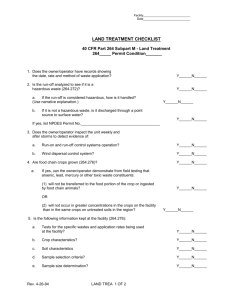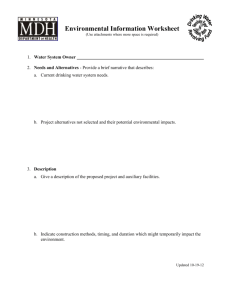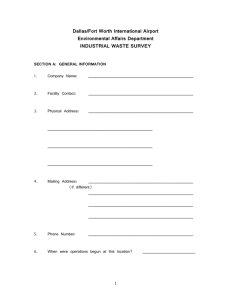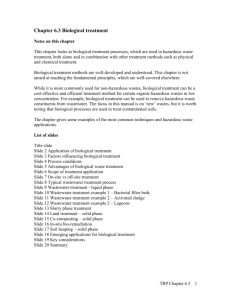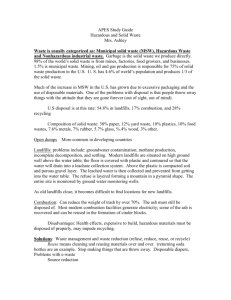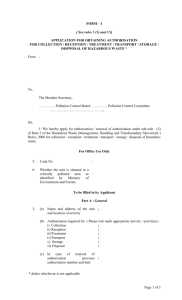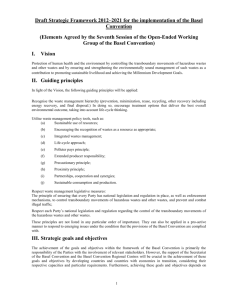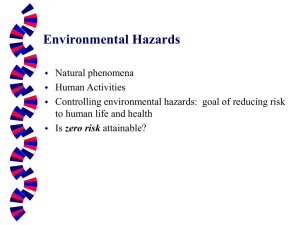Nigeria - Basel Convention
advertisement
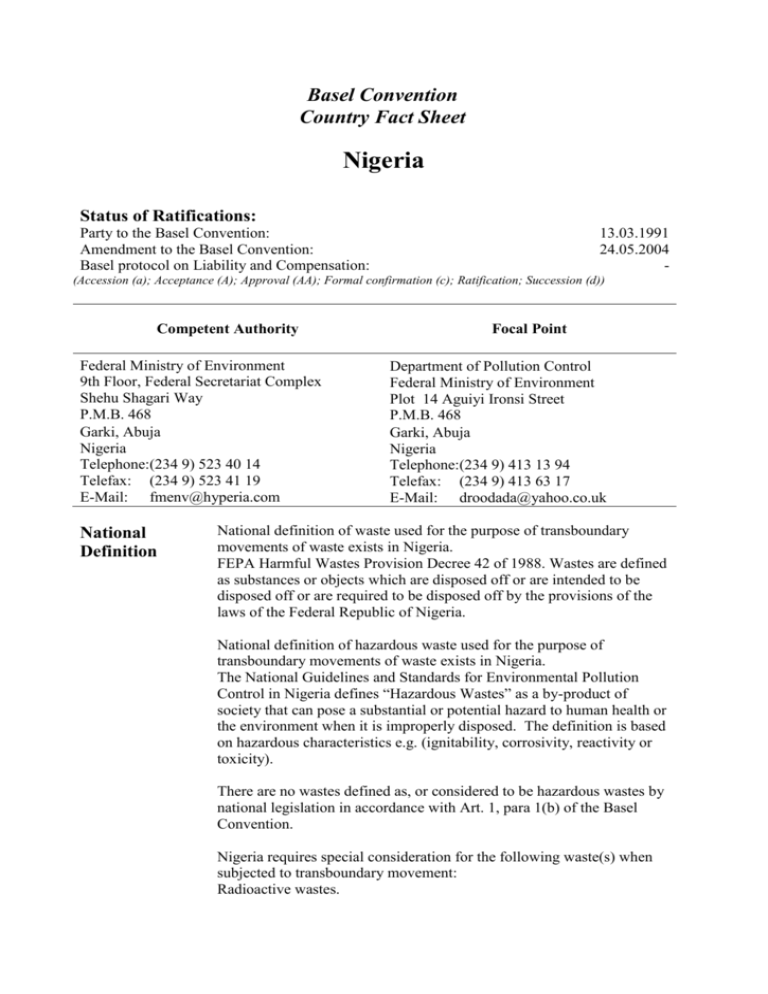
Basel Convention Country Fact Sheet 2002 2006 Nigeria Status of Ratifications: Party to the Basel Convention: Amendment to the Basel Convention: Basel protocol on Liability and Compensation: 13.03.1991 24.05.2004 - (Accession (a); Acceptance (A); Approval (AA); Formal confirmation (c); Ratification; Succession (d)) Competent Authority Federal Ministry of Environment 9th Floor, Federal Secretariat Complex Shehu Shagari Way P.M.B. 468 Garki, Abuja Nigeria Telephone:(234 9) 523 40 14 Telefax: (234 9) 523 41 19 E-Mail: fmenv@hyperia.com National Definition Focal Point Department of Pollution Control Federal Ministry of Environment Plot 14 Aguiyi Ironsi Street P.M.B. 468 Garki, Abuja Nigeria Telephone:(234 9) 413 13 94 Telefax: (234 9) 413 63 17 E-Mail: droodada@yahoo.co.uk National definition of waste used for the purpose of transboundary movements of waste exists in Nigeria. FEPA Harmful Wastes Provision Decree 42 of 1988. Wastes are defined as substances or objects which are disposed off or are intended to be disposed off or are required to be disposed off by the provisions of the laws of the Federal Republic of Nigeria. National definition of hazardous waste used for the purpose of transboundary movements of waste exists in Nigeria. The National Guidelines and Standards for Environmental Pollution Control in Nigeria defines “Hazardous Wastes” as a by-product of society that can pose a substantial or potential hazard to human health or the environment when it is improperly disposed. The definition is based on hazardous characteristics e.g. (ignitability, corrosivity, reactivity or toxicity). There are no wastes defined as, or considered to be hazardous wastes by national legislation in accordance with Art. 1, para 1(b) of the Basel Convention. Nigeria requires special consideration for the following waste(s) when subjected to transboundary movement: Radioactive wastes. Restrictions on Amendment to the Basel Convention Transboundary Nigeria is in a preparatory process of implementing the amendment to the Basel Convention (Decision III/1). Movement A memo for the implementation of the amendment to the Basel Convention (Decision III/I) is being considered by the Federal Executive Council. Nigeria has ratified the amendment to the Basel Convention on the Trans-boundary Movement of Hazardous Wastes. Restrictions on export for final disposal Nigeria restricts the export of hazardous wastes and other wastes for final disposal. Decree No. 42 of 1988 on Harmful Wastes currently restricts the export of hazardous wastes for final disposal in Nigeria. The restrictions on the export of these hazardous wastes apply to all countries. Decree No. 42 of 1988 on harmful waste is being reviewed to harmonize it with the Basel Convention. Restrictions on export for recovery Nigeria restricts the export of hazardous wastes and other wastes for recovery. Decree No. 42 of 1988 on Harmful Wastes currently restricts the export of hazardous wastes for recovery in Nigeria. The restrictions on the export of these hazardous wastes for recovery apply to all countries. Decree No. 42 of 1988 on harmful waste is being reviewed to harmonize it with the Basel Convention. Restrictions on import for final disposal Nigeria restricts the import of hazardous wastes and other wastes for final disposal. Harmful Waste Decree No. 42 of 1988 (special criminal provisions etc.). The restriction covers all countries. Restrictions on import for recovery Nigeria restricts the import of hazardous wastes and other wastes for recovery. Decree No. 42 of 1988 on Harmful Waste restricts the import of hazardous wastes for recovery in Nigeria. The restriction covers all countries. Recyclable wastes can only be imported with approved permit given by the Federal Ministry of Environment. Restrictions on transit Nigeria restricts the transit of hazardous wastes and other wastes. Harmful Waste Decree No. 42 of 1988. The restriction covers all countries. Basel Convention signatories are required to obtain written consent of the Competent Authority before the movement occurs. Reduction and/or Elimination of Hazardous Waste Generation National strategies/policies Promotion for the adoption of cleaner production techniques; Establishment of Cleaner Production Centre; and Installation of incinerators for hazardous (hospital) wastes. Sustained awareness- raising Commissioning of Basel Convention Coordinating Centre at the Unversity of Ibadan, Nigeria. National Action Plan on: Biomedical Wastes. National Action Plan on: E-Wastes. Legislation, regulations and guidelines There are existing legislations, regulations and guidelines for the reduction and/or elimination of hazards waste generation in Nigeria. They include: FEPA Harmful Wastes Provision Decree 42, 1988; National Guidelines and Standards for Environmental Pollution Control in Nigeria 1990; National Effluent Limitations Regulations S.1.8 1991; National Pollution Abatement in Industries and Facilities Generating Wastes Regulations S. 1.9 1991; S.1. 15 National Environmental Protection Management of Solid and Hazardous Wastes Regulations 1991; FEPA (Amendment) Decree No. 59 of 1992; Decree 86, 1992 Environmental Impact Assessment; National Guidelines and Standards on Industrial Effluents, Gaseous Emissions and Hazardous Waste Management in Nigeria 1991; National Guidelines and Standards on Water Quality; National Guidelines and Standards on Water Disposal through Underground Injection; National Guidelines on Spilled Oil Fingerprinting; National Guidelines on Registration of Environmental Friendly Products and Eco-labelling; National Guidelines on Environmental Audit in Nigeria; National Guidelines on Environmental Management System; Guidelines on Hazardous Chemicals Management; The Blue Print on Environmental Enforcement: A Citizen’s Guide; Blue Print on Municipal Solid Waste Management in Nigeria 2000; The Blue Print on Compliance Monitoring Inspections; Guidelines on Pesticides Management/Hand Book on Safe and Effective use of Pesticide 2000; and The Blue Print on Waste Management in Nigeria. Economic instruments/ initiatives Environment-friendly awards to industries/facilities that comply with existing rules and regulations on environmental protection; and Compulsory waste audit of facilities/industries every three(3) years Measures taken by industries/waste generators Installation of waste treatment facilities (e.g incinerators, thermal de-sorption units, waste water treatment plants); Self-monitoring; Compliance programs; and Waste Auditing Transboundary Movement Reduction Measures National strategies/policies Promotion for the adoption of cleaner production techniques; Establishment of Cleaner Production Centre; and Installation of incinerators for hazardous (hospital) wastes. Sustained awareness- raising Commissioning of Basel Convention Coordinating Centre at the Unversity of Ibadan, Nigeria. National Action Plan on: Biomedical Wastes. National Action Plan on: E-Wastes. Legislation, regulations and guidelines There are existing legislations, regulations and guidelines for the reduction and/or elimination of hazards waste generation in Nigeria. They include: FEPA Harmful Wastes Provision Decree 42, 1988; National Guidelines and Standards for Environmental Pollution Control in Nigeria 1990; National Effluent Limitations Regulations S.1.8 1991; National Pollution Abatement in Industries and Facilities Generating Wastes Regulations S. 1.9 1991; S.1. 15 National Environmental Protection Management of Solid and Hazardous Wastes Regulations 1991; FEPA (Amendment) Decree No. 59 of 1992; Decree 86, 1992 Environmental Impact Assessment; National Guidelines and Standards on Industrial Effluents, Gaseous Emissions and Hazardous Waste Management in Nigeria 1991; National Guidelines and Standards on Water Quality; National Guidelines and Standards on Water Disposal through Underground Injection; National Guidelines on Spilled Oil Fingerprinting; National Guidelines on Registration of Environmental Friendly Products and Eco-labelling; National Guidelines on Environmental Audit in Nigeria; National Guidelines on Environmental Management System; Guidelines on Hazardous Chemicals Management; The Blue Print on Environmental Enforcement: A Citizen’s Guide; Blue Print on Municipal Solid Waste Management in Nigeria 2000; The Blue Print on Compliance Monitoring Inspections; Guidelines on Pesticides Management/Hand Book on Safe and Effective use of Pesticide 2000; and The Blue Print on Waste Management in Nigeria. Economic instruments/ initiatives Environment-friendly awards to industries/facilities that comply with existing rules and regulations on environmental protection; and Compulsory waste audit of facilities/industries every three(3) years Measures taken by industries/waste generators Installation of waste treatment facilities (e.g incinerators, thermal de-sorption units, waste water treatment plants); Self-monitoring; Compliance programs; and Waste Auditing Disposal/ Recovery Facilities Disposal facilities - International Tools and Supply Nigeria Limited, 55 Tombia St. G.R.A, Phase II, Port Harcourt; Incineration of oily wastes and municipal wastes; D10 - National Institute for Medical Research, Yaba, Lagos; Incineration of hospital wastes; D10 - National Orthopaedic Hospital, Igbobi, Lagos; Incineration of hospital wastes; D10 - National Orthopaedic Hospital, Dala, Kano; Incineration of hospital wastes; D10 - National Orthopaedic Hospital, Enugu; Incineration of hospital wastes; D10 Further information can be obtained from: Federal Ministry of Environment, Housing and Urban Development, Nigeria. Recovery/recycling/re-use facilities - Super engineering Co. LTD,; Solid waste plastic recycling into household products and shoes, pellets ; R3 - Lee Group of Companies, 3 Ladipo Oluwole St. Lagos Nigeria; Solid waste plastic recycling into household products and shoes, pellets; R3 - Star Paper Mills LTD, 114/116, Aba, Umumgasi, Aba, Abia State; Waste paper recycling; R3 - Chellco Industries LTD AI-2, Kudenda Ind. Est P.O. Box 1847 Kaduna; Textile yarn recycling into blankets; R3 - Taewod Floor Covering Co. LTD, Plot 2 A, Lateef Jakade Rd. Ikeja, Lagos; Solid waste plastic recycling into floor carpets; R3 Further information can be obtained from: Federal Ministry of Environment, Housing and Urban Development, Nigeria. Bilateral, Multilateral or Regional Agreements - Multilateral; African countries; ; Bamako Convention on the Ban of the Import into Africa and the Control of Transboundary Movement and Management of Hazardous Wastes within Africa - Technical Assistance and Training Available - Federal Ministry of Environment, Housing and Urban Development, Dept. of Pollution Control and Environmental, Health, 7th and 9th Floor, Federal Secretariat, Shehu Shagari Way, P.M.B 468, Garki,Abuja, Further information can be obtained from: Federal Ministry of Environment, Housing and Urban Development, Nigeria. Data on the Generation and Transboundary Movements of Hazardous Wastes and Other wastes in 2006 (as reported) Amount of hazardous wastes generated under Art. 1(1)a (Annex I: Y1-Y45) of BC Amount of hazardous wastes generated under Art. 1(1)b of BC Generation Total amount of hazardous wastes generated Amount of other wastes generated (Annex II: Y46-Y47) Amount of hazardous wastes exported Export Amount of other wastes exported Amount of hazardous wastes imported Import Amount of other wastes imported Quantities (in metric tons) No data No data No data No data No data No data No data No data
